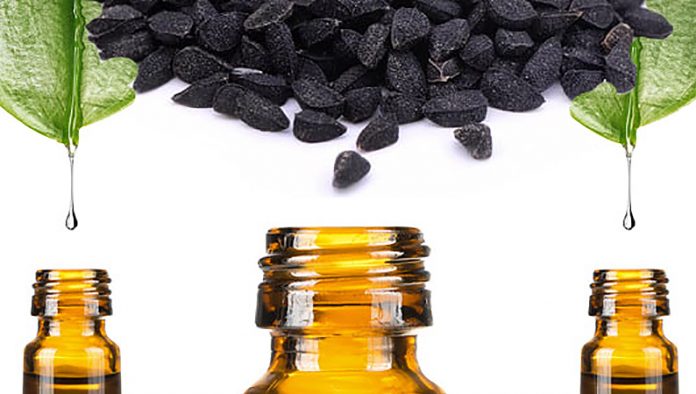Black Seed is fairly new to mainstream natural health, but isn’t new to medicine; it was prescribed to Egyptian pharaohs after extravagant feasts to calm upset stomachs. Ayurvedic medicine uses it for hepatitis, fever, diarrhea and coughs. Today, science shows the oil’s unique compounds—crystalline nigellone and thymoquinone—can be beneficial for various respiratory ailments, as a digestive tonic, and a health and beauty aid for hair and skin.
What is Black Seed Oil?
Black seed oil is made from the seeds of the black cumin (Nigella sativa) plant, which belongs to the ranunculus family. The black cumin plant is native to southwestern Asia, the Mediterranean and Africa. It has been grown for centuries for its aromatic and flavorful seeds that can be used as a spice or as a herbal medicine.
Why is it so beneficial to health?
Black Seed contains over 100 active chemical compounds that may increase health. The three ingredients most studied for their effects are crystalline nigellone – well researched for increasing immune function, especially respiratory health; thymoquinone – researched for cancer treatment, a compound not yet detected in any other medicinal plant; beta-sitosterol – highly researched for gallstones, urinary/prostate health, cancer and cholesterol reduction.
Other health benefits include:
- Help relieve bronchitis
- Remedy colic in babies
- Reduce diarrhea, indigestion and heartburn
- Relieve headaches and migraines
- Calm insomnia
- Help decrease cholesterol and increase the elasticity of blood vessel walls to increase cardiovascular health
- Reduce depression or lethargy
- Reduce signs of eczema
- Ease joint pain and sore muscles (acting as an analgesic)
- Substitute for anti-inflammatory medication
- Help remedy gallstones and kidney stones
- Help prevent poliosis (early greying)
Fast facts about black seed
- Black Seeds are also used in Middle Eastern, Mediterranean and Indian cooking, and have a nutty flavour.
- Black Seed/Black Cumin Seed is not related to the spice cumin
- Black Cumin is sold as “black seed” or “black caraway,” but for therapeutic value, only Nigella sativa is true Black Seed that contains health benefits.
- Nigella sativa (Black Seed) has no known negative side effects
- Black Seed contains good fats: oleic acid (olive oil’s health-giving component), omega 3, omega 6 and omega 7.
Black Seed Scientific Research (with reviews)
Since 1959, Black Seed (Nigella sativa) has been researched in over 200 clinical studies worldwide. Six medical patents have been granted for Black Seed for the following conditions: (Please Note: this information is for reference and interest only from patent licenses that have been issued by approved government agencies and in no way indicates or endorses that our Black Seed Oil should be substituted for consulting a health professional or appropriate medical treatment.)
Asthma/allergy: Black Seed’s powerful anti-inflammatory compounds reduce symptoms of asthma and allergies. (Pulm Pharmacol Ther. 2009)
Viral and bacterial infections: Since salmonella’s resistance to antibiotics is a worldwide health issue, a study wanted to develop an alternative. Black Seed was found to be more effective against salmonella, even those species for which Ceftriaxone and Ciprofloxacin were ineffective. (Nat Prod Res. 2014).
Immune function: Several peer-reviewed studies show that Black Seed Oil helps to relieve respiratory illnesses such as viral infections, colds, and influenza by boosting the activity of our “natural killer” disease fighters.
Diabetes: Black Seed helps to balance blood sugar levels, and has been shown to be effective to treat type 2 diabetes due to its ability to improve insulin sensitivity. (Saudi Arabia, Crit Rev Food Sci Nutr. 2010 & 2011 study at the University of Montreal).
Psoriasis: Nigella sativa extract produced results equivalent to the effect of the standard drug used, tazarotene, for “eruptions of skin”. It also helps stop psoriasis from spreading equal to drug treatment. (Pharmacogn Mag. 2012).
Cancer: Dozens of recent cancer studies in respected publications including International Journal of Immunopharmacology (2005), Oxford’s Digestive
Disease Sciences (2009), and the Journal of Ethnopharmacology (2011) state that Black Seed supports functions of macrophage cells and helper T-cells in cancer patients.








